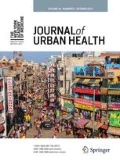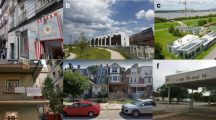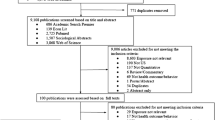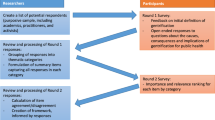Abstract
Gentrification in the largest 50 US cities has more than doubled since the 1990s. The process of gentrification can bring about improved neighborhood conditions, reduced rates of crime, and property value increases. At the same time, it can equally foster negative conditions associated with poorer health outcomes, such as disrupted social networks from residential displacement and increases in stress. While neighborhood environment is consistently implicated in health outcomes research, gentrification is rarely conceptualized as a public health issue. Though research on gentrification is growing, empirical studies evaluating the health impacts of gentrification in the US are poorly understood. Here we systematically review US population-based empirical studies examining relationships between gentrification and health. Electronic databases (PubMed, Embase, CINAHL, PsycINFO, Scopus, Web of Science, and Academic Search Complete) were searched using a combination of terms to identify peer-reviewed studies published on or before July 9, 2018, reporting associations between gentrification and health. Study title and abstract screenings were followed by full-text review of all studies meeting the following inclusion criteria of: ≥ 1 quantitative measure of association for a health outcome, within the context of gentrification; peer-reviewed research; located in the US; and English language. Of 8937 studies identified, 6152 underwent title and abstract screening, and 50 studies underwent full-text screening, yielding six studies for review. Gentrification exposure measures and health outcomes examined varied widely. Most studies reported little to no overall association between gentrification and health outcomes; however, gentrification was repeatedly associated with undesirable health effects among Black and economically vulnerable residents. Despite seemingly overall null associations between gentrification and health, evidence suggests that gentrification may negatively impact the health of certain populations, particularly Black and low-income individuals. Complexities inherent in operationalizing gentrification point toward the need for validated measures. Additionally, understanding how gentrification-health associations differ across health endpoints, race/ethnicities, socioeconomic status, and life course can provide insight into whether this process contributes to urban inequality and health disparities. As gentrification occurs across the US, it is important to understand how this process impacts health. While aging cities reinvest in the revitalization of communities, empirical research examining relationships between gentrification and health can help inform policy decisions.

Similar content being viewed by others
References
Hwang J, Lin J. What have we learned about the causes of recent gentrification? Cityscape. 2016;18(3):9–26.
Williams DR. Race, socioeconomic status, and health. The added effects of racism and discrimination. Ann N Y Acad Sci. 1999;896:173–88.
Bates LK. Gentrification and displacement study: implementing an equitable inclusive development strategy in the context of gentrification. Urban Studies and Planning Faculty Publications and Presentations. Portland State University PDXScholar; Portland, Oregon; 2013;83.
Cassel J. The contribution of the social environment to host resistance. The fourth Wade Hampton frost lecture. 1976. Am J Epidemiol. 1995;141(9):798–814. discussion 797
Baum F. Social capital: is it good for your health? Issues for a public health agenda. J Epidemiol Community Health. 1999;53(4):195–6.
Knotts HG, Haspel M. The impact of gentrification on voter turnout. Soc Sci Q. 2006;87(1):110–21.
Centers for Disease Control and Prevention. Health Effects of Gentrification. 2013 [Available from: https://www.cdc.gov/healthyplaces/healthtopics/gentrification.htm. Accessed 2 Jul 2019.
Cozier YC. Invited commentary: the enduring role of "place" in health-a historic perspective. Am J Epidemiol. 2017;185(11):1203–5.
Arcaya MC, Tucker-Seeley RD, Kim R, Schnake-Mahl A, So M, Subramanian S. Research on neighborhood effects on health in the United States: a systematic review of study characteristics. Soc Sci Med. 2016;168:16–29.
Geronimus AT, Hicken M, Keene D, Bound J. "Weathering" and age patterns of allostatic load scores among blacks and whites in the United States. Am J Public Health. 2006;96(5):826–33.
McEwen BS. Protective and damaging effects of stress mediators: the good and bad sides of the response to stress. Metab Clin Exp. 2002;51(6 Suppl 1):2–4.
Schwartz AR, Gerin W, Davidson KW, Pickering TG, Brosschot JF, Thayer JF, et al. Toward a causal model of cardiovascular responses to stress and the development of cardiovascular disease. Psychosom Med. 2003;65(1):22–35.
Venis Wilder A-LM, Makoba E, Arniella G. The Health Impact of Gentrification. 2017;4:1981–91.
Mujahid MS, Sohn EK, Izenberg J, Gao X, Tulier ME, Lee MM, et al. Gentrification and displacement in the San Francisco Bay area: a comparison of measurement approaches. Int J Environ Res Public Health. 2019;16(12):2246.
Maciag M. Gentrification in America Report 2015 [Available from: https://www.governing.com/gov-data/census/gentrification-in-cities-governing-report.html. Accessed 23 Jul 2019.
Lees L, Slater T, Wyly EK. Gentrification: Routledge; 2008.
Wyly EK, Hammel DJ. Gentrification, segregation, and discrimination in the American urban system. Environ Plan A. 2004;36(7):1215–41.
Mitchell B, Franco J. HOLC “REDLINING” MAPS: the persistent structure of segregation and economic inequality. National Community Reinvestment Coalition; Washington, DC; 2018.
Mehdipanah R, Marra G, Melis G, Gelormino E. Urban renewal, gentrification and health equity: a realist perspective. Eur J Pub Health. 2017;28(2):243–8.
McCartney G, Hearty W, Taulbut M, Mitchell R, Dryden R, Collins C. Regeneration and health: a structured, rapid literature review. Public Health. 2017;148:69–87.
Slater T. North American gentrification? Revanchist and emancipatory perspectives explored. Environ Plan A. 2004;36(7):1191–213.
Moher D, Shamseer L, Clarke M, Ghersi D, Liberati A, Petticrew M, et al. Preferred reporting items for systematic review and meta-analysis protocols (PRISMA-P) 2015 statement. Syst Rev. 2015;4(1):1.
Development USDoHaU. Moving to opportunity for fair housing [Available from: https://www.hud.gov/programdescription/mto.
Babineau J. Product review: Covidence (systematic review software). Journal of the Canadian Health Libraries Association/Journal de l'Association des bibliothèques de la santé du Canada. 2014;35(2):68–71.
Huynh M, Maroko AR. Gentrification and preterm birth in new York City, 2008-2010. J Urban Health. 2014;91(1):211–20.
Gibbons J, Barton MS. The Association of Minority Self-Rated Health with black versus white gentrification. J Urban Health. 2016;93(6):909–22.
Smith RJ, Lehning AJ, Kim K. Aging in place in gentrifying neighborhoods: implications for physical and mental health. The Gerontologist 2017;58(1):26–35. https://doi.org/10.1093/geront/gnx105.
Izenberg JM, Mujahid MS, Yen IH. Health in changing neighborhoods: a study of the relationship between gentrification and self-rated health in the state of California. Health Place. 2018;52:188–95.
Mair C, Diez Roux AV, Golden SH, Rapp S, Seeman T, Shea S. Change in neighborhood environments and depressive symptoms in new York City: the multi-ethnic study of atherosclerosis. Health Place. 2015;32:93–8.
Lim S, Chan PY, Walters S, Culp G, Huynh M, Gould LH. Impact of residential displacement on healthcare access and mental health among original residents of gentrifying neighborhoods in New York City. PloS one. 2017;12(12):e0190139.
Gibbons J, Barton M, Brault E. Evaluating gentrification’s relation to neighborhood and city health. PloS one. 2018;13(11)
Freeman L. Displacement or succession?: residential mobility in gentrifying neighborhoods. Urban Aff Rev. 2005;40:463–91.
Bernt M. Gentrification between urban and rural. Dialogues Hum Geogr. 2018;8(1):31–5.
Barton M. An exploration of the importance of the strategy used to identify gentrification. Urban Stud. 2016;53(1):92–111.
Lin J, editor Gentrification and transit in northwest Chicago. Transportation Quarterly. 2002;56:175–191.
Papachristos AV, Smith CM, Scherer ML, Fugiero MA. More coffee, less crime? The relationship between gentrification and neighborhood crime rates in Chicago, 1991 to 2005. City Community. 2011;10(3):215–40.
Hwang J. Gentrification in changing cities: immigration, new diversity, and racial inequality in neighborhood renewal. Ann Am Acad Pol Soc Sci. 2015;660(1):319–40.
Wong DW. The modifiable areal unit problem (MAUP). WorldMinds: geographical perspectives on 100 problems: Springer; 2004. p. 571–5.
Diez-Roux AV. Multilevel analysis in public health research. Annu Rev Public Health. 2000;21(1):171–92.
Nelson PB, Hines JD. Rural gentrification and networks of capital accumulation—a case study of Jackson, Wyoming. Environ Plan A. 2018;50(7):1473–95.
Nelson PB, Oberg A, Nelson L. Rural gentrification and linked migration in the United States. J Rural Stud. 2010;26(4):343–52.
Kirkland E. What's race got to do with it? Looking for the racial dimensions of gentrification. West J Black Stud. 2008;32(2)
Page MJ, McKenzie JE, Higgins JPT. Tools for assessing risk of reporting biases in studies and syntheses of studies: a systematic review. BMJ Open. 2018;8(3):e019703.
Acknowledgements
Research was supported by grants from the National Institute for Minority Health and Health Disparities (P60MD000214), the National Institute on Aging (1K02AG059140), the Hopkins Center for Health Disparities Solutions Pilot Project Award (U54MD000214), the National Cancer Institute grant (K01CA184288), National Institute of Mental Health (R25MH083620), and the Sidney Kimmel Cancer Center grant (P30CA006973).
Author information
Authors and Affiliations
Corresponding author
Additional information
Publisher’s Note
Springer Nature remains neutral with regard to jurisdictional claims in published maps and institutional affiliations.
Rights and permissions
About this article
Cite this article
Smith, G.S., Breakstone, H., Dean, L.T. et al. Impacts of Gentrification on Health in the US: a Systematic Review of the Literature. J Urban Health 97, 845–856 (2020). https://doi.org/10.1007/s11524-020-00448-4
Published:
Issue Date:
DOI: https://doi.org/10.1007/s11524-020-00448-4




